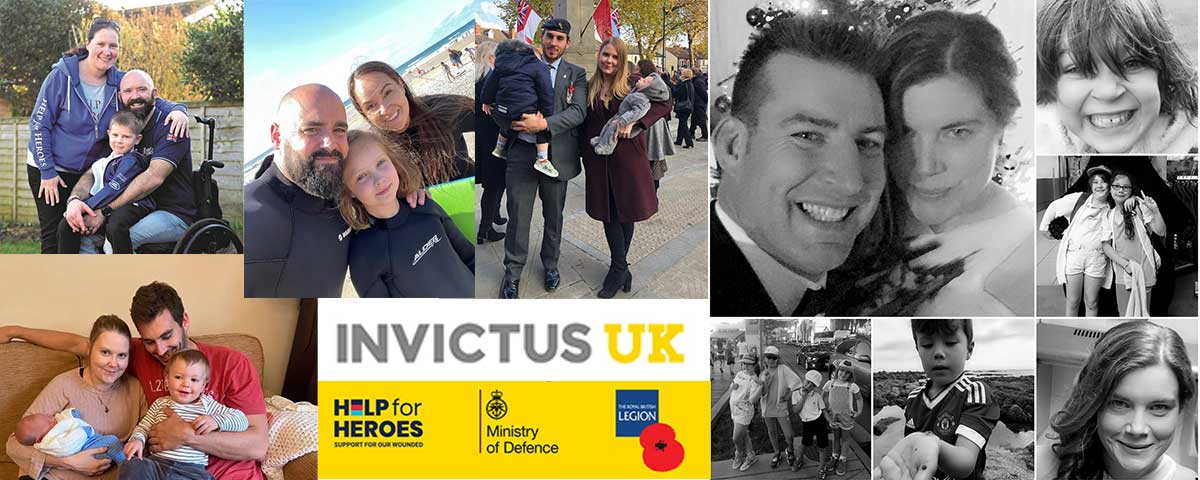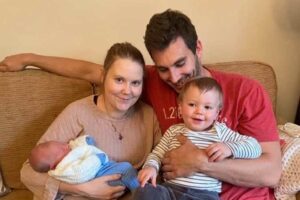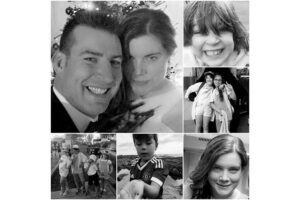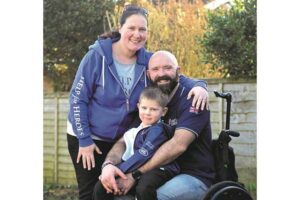
As proud sponsors of Team UK at the Invictus Games, The Hague, we’re counting down the days till competitors are finally able to show off everything they’ve been training for since The Games were postponed due to the Covid-19 pandemic.
We’ve been speaking to friends and family members of Team UK to find out how they’ve been supporting their competitors, and what advice they have to give to anyone helping a loved one through a difficult time.
Leanne Kelly – partner of competitor Paul Inman (Athletics, Cycling, Powerlifting and Swimming)

1. What was the impact on the family when the Games got postponed last year?
“We were literally at the point of final camp as the Games got postponed, so we went from excited & fully prepared to be attending, to disappointment. Part of Paul’s injury means that he doesn’t cope very well with not having much control over his schedule, so it was difficult not knowing what would be happening & having the uncertainty of would things go ahead or not.
On top of the Games, we were also weeks away from having our first child. Having gone through the Invictus journey with Paul & classing a lot of the competitors & their families as such close friends, we were looking forward to them meeting our new arrival at The Hague. Instead they all met him virtually on a Zoom call!
2. How have you been supporting them through their new journey?
It hasn’t been easy helping him to balance his work, family & training commitments and we’ve had to find the time wherever possible. Our spare bedroom has been converted into a home gym, swimming trips with the children meant booking a venue where Paul could also do some training at the same time, walks with the dog was an opportunity to practice throwing, and our eldest son has clocked up hundreds of miles whilst strapped in a bike seat on the back of his dad’s bike!
On top of balancing everything, Paul also developed further complications on his knee which required more surgery in late 2020, completely stopping his training till he recovered.
This had a knock-on Paul’s confidence – he was very worried about attending the first training camp after the Covid pandemic and at times, he’s needed a lot of encouragement. There have been times I’ve driven him to a training camp myself to make sure he went. But once he gets to the camps he loves them, training and being with his Invictus family.
3. What advice would you give to anyone supporting their friend or family member through a similarly life-changing event like a disability?
While it’s important to always be there to offer support, it’s also OK, to want to take care of yourself & your own mental health – you can’t fill up someone’s cup if your own is empty.
It’s very hard to comprehend how difficult the simplest of tasks can become to your loved ones and it is easy to become frustrated. I think you need to develop a lot of patience and step up to help with the tasks where it’s possible.
Lastly I would say you aren’t going through this alone. There is a lot of support out there and don’t be afraid to reach out for help!
Marcus Ross, husband of competitor Vicki Ross (Archery, Cycling, Rowing, Sitting Volleyball, Wheelchair Rugby, Wheelchair Basketball)

1. What was the impact on the family when the Games got postponed in 2020?
The postponement of the games was somewhat devastating for our family. All the hard work Vicki had put into training/practicing for all the difference events and all the support we had given her to help her on her recovery felt, in a way, lost. We all had to re-evaluate what had happened and how to reframe the situation, taking positives from the journey overall.
2. How have you been supporting them through their new journey?
We have been supporting Vicki in many ways. From reminding her how well she’s doing and encouraging her to be her best, to making sure the family and household are taken care of so she can relax when she gets home from training camps – she attends seven or so for the different disciplines she’s looking to take part in.
3. What advice would you give to anyone supporting their friend or family member through a similarly life-changing event like a disability?
The advice I would give to them is to be patient and be accepting of their feelings. Remind them of just how great they are and how far they have come, let them know you are proud of them, even for the smallest of things. Each step is one closer to a goal and one further from the past experience
Help them to accept their new reality and make the most of who they are today (now) because the new them is a new opportunity/challenge. All in all just show them that you love them every single day through the good times and bad times.
Lisa Mitchell, wife of competitor Jonny Mitchell (Athletics, Powerlifting)

1. What was the impact on the family when the Games got postponed last year?
As a family we were disappointed that the Games were postponed again last year. However, we preferred for it to be postponed rather than be held virtually or cancelled completely. Jonny thrives when he is able to be with his teammates and coaches in person – not only with regards to the sport but also his recovery process – so it was good to have something to look forward to.
Me and my daughter also get so much from attending the games and being with other people who have been through a similar traumatic situation to us. So, we really look forward to getting back to the camps and the Games as soon as possible.
2. How have you been supporting them through their new journey?
Jonathan is very focused on his training so as a family we ensure we support him with this. We all try to get involved with keeping active and often get out for a walk together with the dogs.
3. What advice would you give to anyone supporting their friend or family member through a similarly life-changing event like a disability?
I’d encourage them to seek out a support network of people in a similar situation and get in touch with veterans in the local community – One of the hardest things Jonny went through was grieving the loss of his career in the army. However, staying in contact with like-minded people and having a network of veterans gave him the sense of belonging that he thought he had lost when he was medically discharged.
Try to remain active and don’t let your disability be life limiting. As the Invictus athletes all show, you can achieve anything when you set your mind to it. Sports recovery has helped Jonny to remain focused, physically active, independent, healthy and has massively improved his mental health.
Sarah Philipps, wife of competitor Dan Philipps (Athletics, Rowing, Wheelchair Basketball, Wheelchair Rugby)

1. What was the impact on the family when the Games got postponed in 2020?
It felt like such a shock because we’d been doing so much training camps and were so close to going, but as with everything in 2020, all we could do was take it in our stride and focus on our family. Dan was so disappointed as he worked so hard, but he came to terms with it and handled it in the same way he has other setbacks – it’s another challenge to face.
2. How have you been supporting them through their new journey?
We’ve kept fit, healthy and active as a family – it would have been easy to let things slip over lockdown. He did a lot of training at home though in his workshop on the rowing machine and we’ve gone on a lot of family walks. He also goes over to Eastbourne for practices and can get a bit anxious about going away and leaving, but we always encourage and support him to go.
3. What advice would you give to anyone supporting their friend or family member through a similarly life-changing event like a disability?
Reassurance is key and you have to be supportive in whatever way you can. Dan was injured physically, but he was also injured mentally and went through a lot of emotional changes. You have to be a voice and an advocate for that person, especially if they’re dealing with depression or anxiety, and encourage them.
It’s stressful for you and the family, but you need to remember it’s an adjustment period. While Dan can’t do things as he used to, he can still do lots of other things – playing football with the boys has changed to painting and crafts, or taking our sons to the bike track with him as he trains.
I do think sport is the best tool for people who have been disabled. The first time we went to the Invictus trials he didn’t think he could do it, but the Games has shown him there’s so many adaptive ways he can take part. It’s created a community for him, with people who understand exactly what he’s going through.